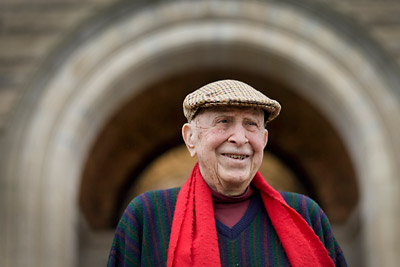University Ombudsman Walter Lynn steps aside
By Lauren Gold

Atop the neatly stacked papers on a shelf beside Walter Lynn's desk lies a single sheet on which he has summed up his job. Its title, "Some Desired Attributes and Abilities of a Cornell University Ombudsman," is simple and direct.
Below, he has listed 10 items. "Ability to work within the university governing structure" is one. "Common sense" is another.
For Lynn, professor emeritus of civil and environmental engineering and science and technology studies, this job has been a perfect fit.
In his 12 years as university ombudsman, Lynn has advised students, faculty, staff and potential students and employees on issues from student grades to employee dismissals, and sexual harassment to tenure. The ombudsman's Stimson Hall office serves the entire Cornell community, reaching as far as the Arecibo Observatory in Puerto Rico. Some people make appointments; others just walk in.
The position is officially half time, but there is plenty to do. "I'm a multitasker. I can do a variety of things at the same time," Lynn says.
"Some people get all stressed out," he adds. "Do I look stressed out?"
He does not.
But he is ready to move on. In June, Lynn will leave the job to his yet-to-be-chosen successor. Nominations are being accepted for the position.
Lynn is the university's 11th ombudsman, a post created in 1969 and first held by ILR School professor Alice Cook. Most who hold the position stay for two to four years. Lynn has held the post since 1998.
The office guidelines, meanwhile, haven't changed since 1969. They boil down to five words: independence, neutrality, impartiality, informality and confidentiality.
First and foremost, Lynn says, is confidentiality. "We're extraordinarily careful not to violate that principle. We can't even say you were here," he says. "The moment you compromise that, the whole thing begins to unravel."
For this reason, the office does not keep records or notes. But it does hold every manner of reference book on university history and policy, which Lynn and colleagues Linda Falkson, associate ombudsman, and Adam Kleinberger, assistant ombudsman, use in advising clients.
Lynn, who joined the faculty in 1962, knows Cornell inside and out. He has directed a half-dozen projects and centers on campus, and served as dean of the faculty from 1988-93. And he knows the community; he was mayor of Cayuga Heights from 2002-08 and has led organizations from the Southern Cayuga Lake Intermunicipal Water Commission to the New York State Water Resources Planning Council.
The university ombudsman holds no official power, he says; he cannot change policy or force resolutions. But the office's history of independence, impartiality and prudence lends it a different kind of power, he adds. "Our power is the goodwill of the institution."
Often, though, his role is simply to listen. Hence items eight, nine and 10 on his desired attributes list: "Ability to assist people experiencing strong emotions," "Ability to build trust with strangers" and "Non-judgmental, good listener, fair, diplomatic, calm, sensible."
He keeps bowls of jelly beans and bridge mix on a table. He welcomes everyone.
"The crucial thing in this job is, never take yourself too seriously. That's absolutely essential," he says. "Start taking yourself too seriously and you're in big trouble. Just terrible trouble."
And while his role often involves hearing about problems, he keeps the big picture in mind.
"The object is to try to be as helpful as you can. And that helpfulness is not a good Samaritan thing - it's helpful to the institution as a whole," he says.
"I think [Cornell is] a great institution," he adds. "Its imperfections are minor and always addressable. It's worth doing anything you can to make it better."
Media Contact
Get Cornell news delivered right to your inbox.
Subscribe